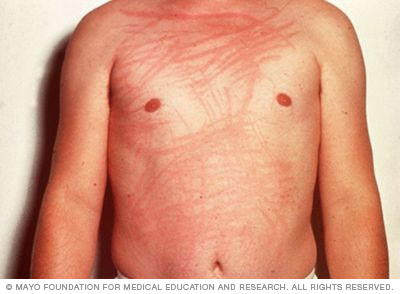Dermatographia (Dermatographism)
Overview
Dermatographia is a condition in which lightly scratching your skin causes raised, inflamed lines or welts. These marks tend to go away in less than 30 minutes. The condition is also known as dermatographism and skin writing.
The cause of dermatographia is unknown, but it may be related to an infection, emotional upset or a medicine you're taking.
Dermatographia is harmless. Most people who have this condition don't need treatment. If your symptoms bother you, talk with your health care provider, who might prescribe an allergy medicine.

Dermatographia is a condition in which lightly scratching your skin causes raised, inflamed lines where you've scratched. Though not serious, it can be uncomfortable.
Symptoms
Symptoms of dermatographia may include:
- Raised, inflamed lines where you scratched.
- Welts from friction.
- Swelling.
- Itching.
The symptoms may occur within a few minutes of the skin being rubbed or scratched. They tend to go away within 30 minutes. Rarely, the skin symptoms develop more slowly and lasts several hours to days. The condition itself can last for months or years.
When to see a doctor
See your health care provider if your symptoms bother you.
Causes
The exact cause of dermatographia isn't clear. It may be an allergic reaction, though no specific allergen has been found.
Simple things may cause symptoms of dermatographia. For example, rubbing from your clothes or bedsheets may irritate your skin. In some people, the symptoms are preceded by an infection, emotional stress, vibration, cold exposure or taking a medicine.
Risk factors
Dermatographia can occur at any age. It tends to be more common in teens and young adults. If you have other skin conditions, you may be at greater risk. One such condition is atopic dermatitis (eczema).
Prevention
Try these tips to reduce discomfort and prevent the symptoms of dermatographia:
- Treat skin gently. Use a mild soap or nonsoap cleanser and pat skin dry. Wear things made of cloth that doesn't itch. Use warm water when you take a bath or shower.
- Don't scratch your skin. Try not to scratch. This is a good tip for any skin condition.
- Keep your skin moisturized. Use creams, lotions or ointments daily. Creams and ointments are thicker and tend to work better than lotions do. Apply your skin product while your skin is still damp from washing. Use it again during the day as needed.
Diagnosis
To test if you have dermatographia, your health care provider may draw a tongue depressor across the skin of your arm or back. If a raised line or a welt appears within a few minutes, you likely have the condition.
Treatment
Treatment for dermatographia often isn't needed, as symptoms tend to clear up on their own. But if your symptoms are bad or bother you, your health care provider may suggest a mild antihistamine medicine taken by mouth. These are sold at drugstores. First try a type doesn't cause drowsiness, such as fexofenadine (Allegra), loratadine (Alavert, Claritin, others) or cetirizine. If none of these help, your health care provider may prescribe a stronger medicine for use at bedtime. An example is doxepin.
Preparing for an appointment
You're likely to start by seeing your primary care provider. Or you may be referred to a doctor who specializes in skin conditions. This type of doctor is called a dermatologist. Or you might need to see a doctor who specializes in allergies. This type of doctor is called an allergist.
Here's some information to help you prepare for your appointment.
What you can do
At the time you make the appointment, ask if you need to do anything. For example, you may be asked to stop taking your antihistamine pill for a few days before your appointment.
You may also want to:
- List your symptoms, including any that seem unrelated to your skin symptoms.
- List key personal information, including any major stresses or recent life changes.
- List all medicines, vitamins or supplements you're taking.
What to expect from your doctor
Your health care provider is likely to ask you a few questions, including:
- When did you begin experiencing symptoms?
- Were you sick right before your symptoms started?
- Did you start taking a new medicine right before your symptoms started?
- Have your symptoms been nonstop? Or do they come and go?
- How bad are your symptoms?
- Do your symptoms get in the way of your daily activities?
- Do you have allergies? If so, what are you allergic to?
- Do you have dry skin or any other skin conditions?
- Does anything improve your symptoms?
- Does anything make your symptoms worse?
Last Updated Feb 4, 2023
© 2024 Mayo Foundation for Medical Education and Research (MFMER). All rights reserved. Terms of Use



